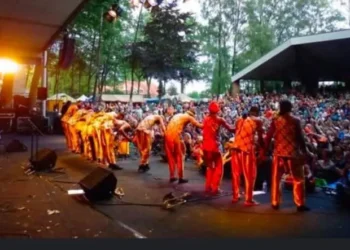In recent years, a growing discourse has emerged around accusations of betrayal against certain African leaders and elites who are perceived to prioritize Western interests over the needs and aspirations of their people.
This phenomenon, often framed in the context of “betraying their own” to appease “white men,” is a multifaceted issue that reflects historical legacies, economic dependencies, and the complex interplay of global politics.
Popular Ghanaian comedian, DKB, has lamented the state of politics in African countries, criticizing what he describes as the deceitful actions of politicians.
In a post on X, the comedian accused some Africans of betraying their people to please “white men.”
“An African ready to betray his own to please a white man, even animals reason better than them. Ever seen a zebra betray the herd to lions before. Only stupid Africans. Sadly, we have political parties made up of them. Sorry for Africa.”
DKB
The accusations of betrayal are deeply rooted in Africa’s colonial history. For over a century, many African nations were subjected to foreign rule, during which time African leaders were often co-opted into serving colonial interests.
This legacy of collaboration has left a lasting imprint on the continent’s political landscape. Post-independence, many African leaders have been criticized for continuing to align with Western powers, often at the expense of their citizens’ welfare.
In the contemporary landscape, several factors contribute to the perception that some African leaders are betraying their people.

Many African countries rely heavily on foreign aid, investment, and trade with Western nations. This dependency leads to policies that favor foreign interests over local needs.
Critics argue that some leaders prioritize agreements that benefit Western corporations, often leading to the exploitation of natural resources without adequate compensation or benefits for local communities.
Corruption remains a significant issue in many African nations. African leaders and elites who accumulate wealth and power often do so through deals that favor foreign interests.
This has led to the perception that they are more interested in maintaining their status and wealth than in addressing the needs of their constituents.
Cultural dynamics also influence the narrative of betrayal. In many African societies, loyalty to one’s community and nation is paramount. When leaders are seen as aligning with foreign powers, they risk alienating their base and inciting public outrage.
The Democratic Republic of Congo (DRC) has vast mineral wealth, yet it remains one of the poorest countries in the world.
Accusations have been leveled against leaders perceived to have sold off mining rights to foreign companies, resulting in environmental degradation and little benefit to local communities.
The legacy of colonial exploitation looms large, with many citizens feeling that their leaders are repeating history.
As Africa’s largest economy, Nigeria has seen its leaders accused of corruption and collusion with foreign oil companies.
The Niger Delta region, rich in oil, has suffered environmental degradation and social unrest, leading to claims that the government is betraying the very people it is meant to serve.
Role of Civil Society on African Leaders

In response to these dynamics, civil society organizations and grassroots movements have emerged as critical voices advocating for accountability and transparency.
They challenge African leaders to prioritize the needs of their communities and push back against policies that favor foreign interests.
These movements often highlight the importance of local engagement and the need for leaders to be held accountable to their constituents.
The accusations of betrayal among African leaders underscore a complex interplay of historical legacies, economic dependencies, and social expectations.
While some leaders indeed prioritize foreign interests, it is essential to recognize the broader systemic issues at play, including globalization, corruption, and the lingering effects of colonialism.
Addressing these challenges requires a concerted effort from both leaders and citizens to foster a more equitable and just society that prioritizes the needs of the people over external pressures.
Ultimately, the path forward lies in building a collective vision that honors the aspirations of all Africans, ensuring that their voices are heard and respected in the global arena.
READ ALSO: Structural Reforms, Transparency Critical to Government’s Cost-Cutting Measures – Analyst



















